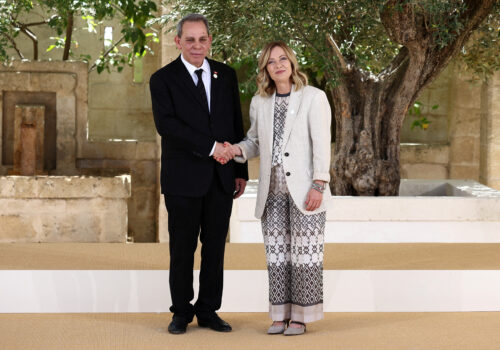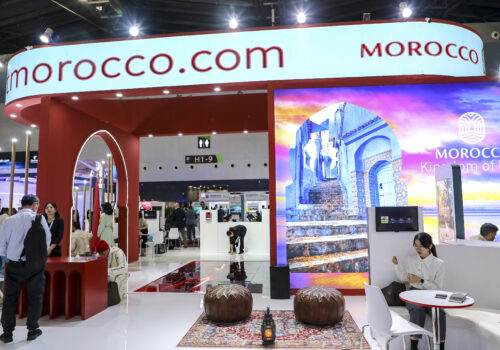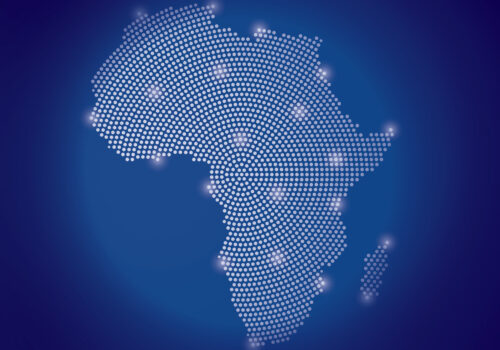France has sided with Morocco on the Western Sahara. How might Algeria respond?
On Tuesday, France moved toward recognizing Moroccan sovereignty over the disputed territories of Western Sahara in a historic diplomatic shift for Paris and a major diplomatic victory for Rabat. Morocco’s neighbor Algeria was quick to signal its displeasure, saying that France’s decision was “the result of a dubious political calculation” and a “morally questionable judgment.” Will this realignment turn the page of the long-running Sahara conflict once and for all? Or will it further destabilize an already volatile region?
The news broke after the Moroccan royal palace released a communiqué that referenced a letter from French President Emmanuel Macron to the king of Morocco on the commemoration of the silver jubilee of his coronation. The letter states that the “present and future of Western Sahara fall within the framework of Moroccan sovereignty.” In his correspondence with the Moroccan king, Macron added that “France intends to act consistently with this position at both national and international levels.” Although the French position explicitly references Moroccan sovereignty over Western Sahara, it will need more clarification and translation into concrete policies in the coming months.
Nonetheless, the French decision is particularly significant given its colonial past in North Africa and its shared responsibility with Spain in largely determining the postcolonial borders of Morocco, Algeria, and Mauritania. These borders are the origin of many of the current territorial disputes in the region. France’s endorsement of the Moroccan autonomy plan this week follows similar support from Spain in 2022 and recognition of Moroccan sovereignty over Western Sahara expressed by the United States in 2020 and Israel in 2023, along with a growing list of Arab and African nations.
Understanding the French calculus
France’s shift of stance comes as its relations with Morrocco have been strained. Since 2020, Rabat has pressured Paris to break the status quo—a neutrality on the issue apparently intended not to upset either Morocco or Algeria—and take a clearer stance on the Western Sahara. Striking a deal with then-US President Donald Trump in 2020 over the disputed territories and normalizing ties with Israel boosted Morocco’s diplomatic confidence and helped redefine the kingdom’s foreign policy. As a result, the Sahara issue, in the words of the Moroccan king, became “the lens through which Morocco looks at the world.”
As an example of the deteriorating bilateral relations, Mohammed VI reportedly “definitely shelved” relations with Macron and declined state visit requests by the French president last year. In addition, the kingdom started to increase its divestment from business partnerships with France—previously considered its international economic partner of choice. Torn between Morocco and Algeria, France failed to balance its act in the Maghreb after a chain of unfortunate events, including the Pegasus spyware case, a visa crisis, and the recall of Rabat’s ambassador to France in February 2023. Most recently, Morocco refused French aid after the Marrakesh earthquake in September 2023.
France, however, never stopped courting Morocco, because Paris did not want to lose strategically important economic and political ground in Africa. For its part, Rabat did not break its relations with Paris entirely, continuing its intelligence and security cooperation with France. Moroccan forces, for example, are currently helping to secure the Paris Olympics. Morocco also appointed Samira Sitail, a dual national and Makhzan insider, as its ambassador to attempt to stir the stagnant waters.
Rather than trying to deter Morocco’s ambitious Atlantic Initiative—aimed at offering landlocked Sahel countries trade access to the ocean through a $1.2 billion harbor in Dakhla, Western Sahara—France is eying a share of the economic benefits promised by the project. The only catch is how to address the 2021 European Union (EU) court ruling against the Morocco-EU trade deal over Western Sahara, which the Elysée may now advocate to reverse together with other pro-Moroccan EU countries ahead of the final judgment, due in a few months.
Western Sahara and global realignment
Another defining factor in understanding the recent French decision lies in the global realignment behind old Cold War frontiers, and NATO allies engaging in historic contests against increasingly destabilizing forces. Morocco has always been a reliable partner to the global liberal West in its fight against Russian aggression and different terrorist groups. The country is also more-or-less aligned with the United States and France on a common vision of the future. As Iran and its proxies reinforce ties with the Algerian regime, which has been cultivating close relations with Russia since the 1970s, North Atlantic allies fear a new stronghold of antagonists in North Africa.
For the past five decades, Western Sahara has been a major security loophole at the doors of the Mediterranean and the Sahel. With growing rumors about Iranian and Wagner Group presence among Sahrawis in the Tindouf camps in western Algeria, where an estimated 173,600 refugees live, it’s becoming imperative for the United States and European countries to try to resolve the Western Sahara file once and for all.
Disrupting the status quo in the Maghreb
While on paper the French decision to side with Morocco may seem in line with its economic and global priorities, it does come at a price. EU neutrality in the Western Sahara conflict and exclusive reliance on the United Nations peacekeeping mission to maintain the status quo between Rabat and Algiers has been central to stabilizing the region. After the United States and Spain sided with Morocco, Algeria responded by severing diplomatic relations with Morocco in 2021 and recalling its ambassador in Madrid in 2022. Algeria also disrupted gas exports to Spain through Morocco by closing the EU-Maghreb pipeline just as tensions were building around Russia’s gas exports ahead of its full-scale invasion of Ukraine.
The first reaction by Algiers to Macron’s swing toward Mohammed VI described France and Morocco as “colonial powers, new and old.” This was followed on Tuesday by Algeria recalling its ambassador in Paris to express its discontent.
Macron’s decision has alienated an already nervous Algerian President Abdelmadjid Tebboune, who is running for reelection on September 7. This week’s events may push him deeper into Iranian and Russian arms. Even though not expressly sought by any of the parties, the risk of recent events sparking up a wider regional conflict in the Maghreb is higher than ever. Even if in a way designed to avoid escalation, Algeria will likely feel it necessary to respond in some form.
Sarah Zaaimi is a cultural studies researcher and the deputy director for communications at the Atlantic Council’s Rafik Hariri Center & Middle East programs.
Further reading
Mon, Jul 29, 2024
The Mattei Plan is an opportunity for North Africa
MENASource By Karim Mezran
North Africa is particularly vulnerable, and the Mattei Plan can positively defuse regional tensions.
Mon, Jul 1, 2024
Diversification and growth: How the US-Morocco FTA boosts Rabat’s modern trade
MENASource By Amin Mohseni-Cheraghlou
With sustained commitment and strategic planning, the next twenty years can bring even more prosperity and development for the Moroccan economy and greater profits for US businesses operating in the kingdom.
Thu, Jun 27, 2024
Migration dynamics in the Atlantic basin: Case studies from Morocco and Nigeria
Report By
This report seeks to provide valuable insights into the ongoing discourse on African migration trends in the global context.
Image: His Majesty King Mohammed VI of Morocco chairs with his son Prince Moulay el-Hassan of Morocco a Council of Ministers, on October 18, 2022, Rabat, Morocco. Photo via DNphotography/ABACAPRESS.COM


